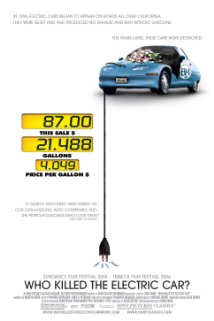
WHO KILLED THE ELECTRIC CAR?
US, 2006, 92 minutes, Colour.
Narrated by Martin Sheen.
Directed by Chris Paine.
A murder mystery with a different kind of victim: the short-lived electric car. It is murder most foul and, keeping the Agatha Christie connection, it seems as though there are more killers than on the Orient Express.
General Motors Electric Car, EV1, may not be as well known as it should be even though it was brought to birth, so to speak, for California and then… perhaps the world. However, it not only died in California. 78 surviving cars in a Burbank pound were taken out in February 2005 and, despite vigorous demonstrations, destroyed. It is said that they were crushed. It has also been said that all their parts have been recycled. Be that as it may, the electric car was buried.
This enterprising and always interesting documentary makes no bones about being partisan. It is against the vested interests or, more appropriately, the invested interests. It introduces us to some personalities who used the electric cars, including Phyllis Diller, an eerily bearded Mel Gibson and Peter Horton. But, it also lines up a highly charged battery of experts.
We can take our pick but one of the most decent and common-sensed is S. David Freeman, energy adviser to Jimmy Carter who saw their efforts dismantled by the Reagan administration – and its Bush legacy.
Agatha Christie again: they are powerful witnesses for the prosecution.
And prosecute the film does. It lines up a number of suspects including the automobile industry, the oil industry, the government, the hydrogen fuel cell, the California Air Resources Board whose meetings made the decision to kill. Also accused are the consumers who did not follow up on this environmentally friendly as well as hugely economical vehicle. All those suspects are pronounced guilty. The only suspect to be found not guilty is the battery – especially in the form of a very genial, now elderly couple, Iris and Stanford Ovshinsky, whose work on batteries for forty years bore success in the electric car.
There is nothing like a well-made documentary to make you think, even to prod your conscience. This one certainly does it and, because it focuses on that indispensable item in our lives, the car, and the possibilities for a better machine in a healthier world, it packs its emotional punch as well.
The electric car could not have hoped for a more caring obituary.